JICA to Provide Equipment to Protect Fair Public Broadcasting in Wartime
2023.03.01
One year has passed since Russia's military invasion of Ukraine, and, for the public in need of news, unhindered reporting on the conflict is essential. The Public Broadcasting Company of Ukraine (PBC) is playing its part in these difficult conditions. “Ukrainian broadcast journalists continue to provide accurate and impartial information to the public despite repeated attacks endangering their lives,” says Miyao Atsushi of NHK International.
Miyao, who has years of experience training broadcasters, was the leader of a five-year-long cooperative project JICA conducted with the PBC that ended in March 2022. Now, as a form of follow-up cooperation, JICA is providing Ukraine with broadcasting equipment, which has been in short supply throughout the war. On February 9, 2023, the first batch of equipment was safely delivered to the PBC headquarters in Ukraine’s capital, Kyiv.
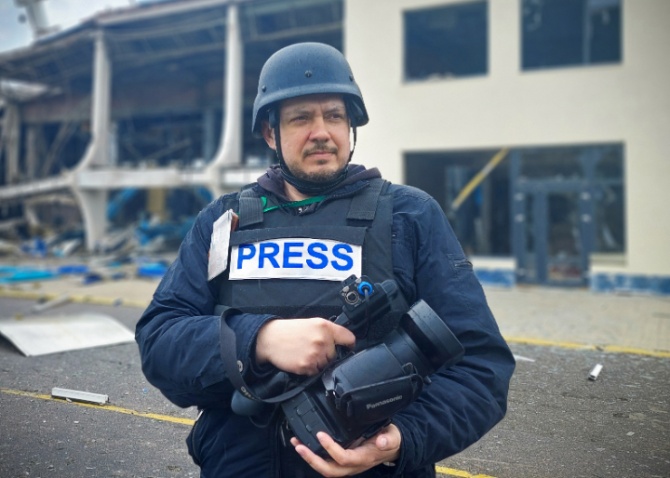
Ukraine’s news media has suffered serious damage, as the war continues with no end in sight. The TV tower in Kyiv was destroyed shortly after the Russian invasion started, and the PBC was forced to temporarily relocate its broadcasting base to Lviv in the western part of the country, where it could be safe and secure. Although the headquarters has returned to its previous location in Kyiv, the situation remains unpredictable, and journalists in each region continue to put their lives on the line to report from the front lines.
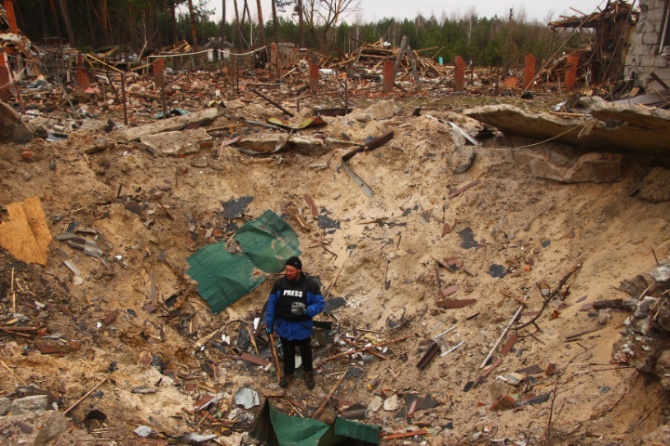
Ukrainian journalists continue to report under difficult circumstances.
The biggest challenge the broadcaster faces at present is a lack of equipment. With the destruction of the TV tower in Kyiv, the headquarters was forced to switch to small, mobile transmitters for on-the-spot reporting, leaving reporters no choice but to use cell phones and other devices to film and transmit their coverage in the field. This has severely restricted field coverage, which plays a major role in wartime reportage.
As a follow-up to the earlier five-year project, JICA procured seven complete sets of equipment, including mobile relay units and cameras, for delivery to the PBC. The first delivery was made safely to the headquarters in Kyiv on February 9, 2023, and a second delivery is planned.
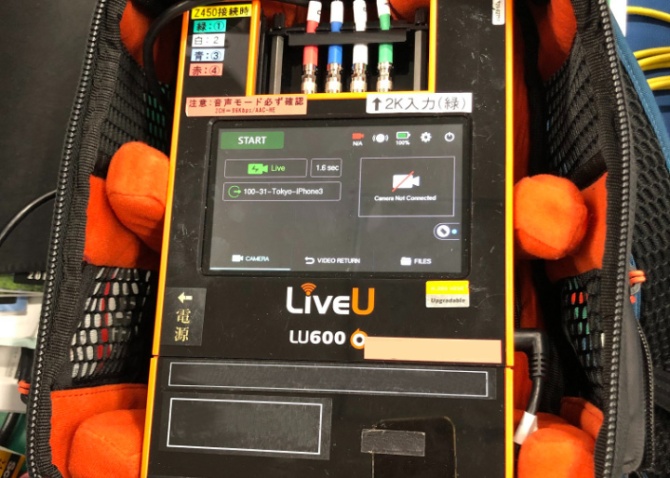
A mobile relay unit for transmitting reports from the field. JICA provided the PBC with smaller and more portable units than the one pictured. Cameras, lenses, filming accessories, and drones were also included in the delivery.
JICA has been cooperating with Ukraine's first public broadcaster, the PBC, since it was launched in 2017, replacing the previous state-owned broadcasting organization.
At the time, four major domestic conglomerates had a monopoly on the main media outlets, and manipulated information. The state-run broadcaster acted as a mouthpiece for the government, and there was concern in the international community that true journalism was unable to exist in Ukraine. The Ukrainian government, which was hoping to join the European Union, decided to transform its state-run broadcaster into a public broadcasting service that would be independent of government control, and would instead broadcast for the public’s benefit.
However, drastic reforms were necessary to change the existing system. JICA turned to NHK International—a company that has worked with developing broadcasters based on its extensive knowledge and global experience—to help launch a public broadcasting service and develop the necessary human resources.
Miyao Atsushi was named to oversee the project. “The establishment of the PBC was prompted by a major issue confronting the mass media in Ukraine,” said Miyao. “It was full of artificial manipulation of public opinion and political advertisements, and was not providing the information that the people really wanted to know.”
The goal of the project was for the PBC to become a model for trusted mass media. “During the days of state-run broadcasting, the average daily viewing rate was less than 1 percent,” he said. “The news was not trusted by the public; its content and program production had ignored the interests of viewers since former Soviet Union times. From the very beginning, I felt a strong sense of duty to convey how public broadcasting should be.”
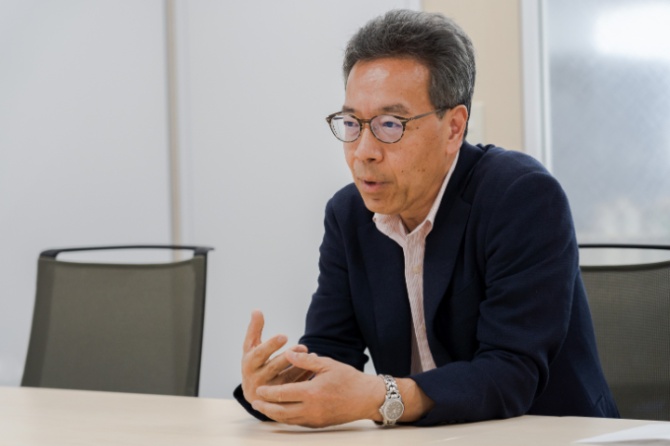
Miyao Atsushi reflects on the five-year project to develop a trusted public broadcaster.
The project was built upon three cornerstones. The first was the expansion of the technology and equipment necessary to produce high-quality programs. The second was the production of educational and welfare programs that only a public broadcaster could provide. The third was the establishment of a system for accurate and timely emergency reporting in the event of disasters or major incidents.
Emergency reporting is the foundation of public broadcasting, as it directly affects the lives and property of citizens. Miyao personally took the lead and worked with the entire PBC staff to reform the system. “In an emergency, it is of the utmost importance that local stations and headquarters coordinate to provide accurate information to the public as quickly as possible,” he said. “We began by building a nationwide network.”
When the broadcasting service was state-run, local stations were strongly independent, and the system was uncoordinated and lacked leadership. The transition began with reforming the entire organization, placing all 22 local stations under the command of the Kyiv headquarters. To strengthen the network, a number of workshops were held so the headquarters management could exchange opinions with all the regional bureaus. Miyao said that a sense of unity and solidarity was strengthened through firmer personal ties and dedicated discussion.

A scene from one of the workshops held for management and regional bureaus. Miyao Atsushi is standing on the left.
A handbook was produced to summarize the know-how required for emergency reporting. The staff members were encouraged to study the practical manual, which covers situations such as the COVID-19 pandemic and military conflicts, and to train in preparation for emergencies. The manual was also used to enhance awareness in the news field and to improve systems through such activities as determining in advance the procedure for mobilizing staff in an emergency.
Over the five years that the project was underway, the public's perception of the PBC changed. Opinion polls now show that the PBC's viewership and trustworthiness have significantly improved, and it is now recognized as a well-balanced media organization that is less biased in its content than the commercial conglomerate broadcasters.
“For a public broadcaster, the most important thing is to remain not-for-profit and to always maintain a certain distance from authority.” said Miyao. “The first chairman of the PBC understood this and always maintained this stance. His outstanding leadership contributed greatly to improving the level of trust in the PBC. His stance has been firmly adopted by the current chairman, Mykola Chernotytsky, who is just 39 years old.”
Toward the end of the five-year program, the PBC had begun to make steady progress as a public broadcaster, though it was not yet fully formed. In 2022, however, a state of emergency arose with the Russian invasion.
New president Mykola Chernotytsky said that the PBC was not caught completely by surprise. The possibility of a Russian invasion was constantly discussed at workshops and other events, so they were able to prepare as an invasion started to look more likely.
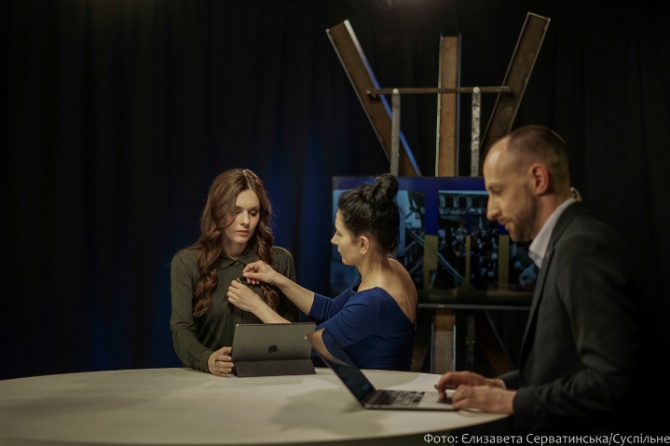
The basement studio of the PBC branch office. When an air raid alarm sounds, they move to this temporary studio to continue broadcasting.
“We prepared three scenarios,” said Chernotytsky. “One, if the eastern part of the country were to be invaded; two, if the southern and eastern parts of the country were to be invaded; three, if the entire country were to be occupied.” This allowed the PBC to quickly transition to an organizational structure, enabling decisions to be made on the ground after the actual invasion. “Currently, with Japan’s cooperation, we are working on a plan to develop backup centers and decentralize the regional stations,” said Chernotytsky.
The second phase of JICA’s cooperation with the PBC was finalized in November, 2022. JICA continues to work with Miyao and others to further strengthen the PBC’s broadcasting capacity by developing backup centers and expanding the functions of local stations with reference to the NHK system.
“I want to help as much as I can, so that the light of Ukraine's first public broadcaster is not extinguished,” said Miyao. ” I pray for their safety in the war zone, and I hope they continue accomplishing their mission as journalists. I also hope that the PBC will survive this war and become even stronger, making a leap forward as a trusted media outlet for everyone in Ukraine.”

Chairman Mykola Chernotytsky (right) and Miyao Atsushi (photo taken in December 2021).
scroll